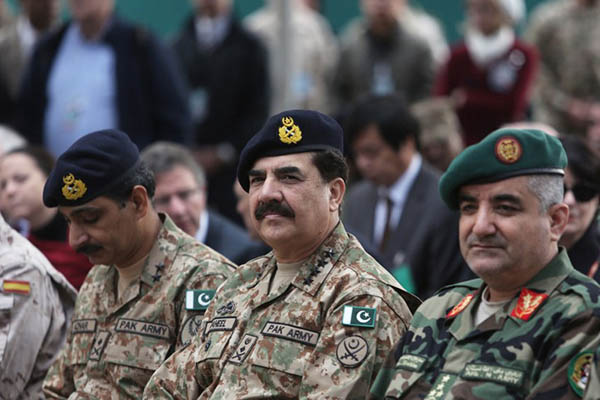
Pakistan Army chief Gen. Raheel Sharif in Kabul earlier this year. Rahmat Gul—AFP
Keeping the Pakistan-Afghanistan border ‘soft.’
The Pakistan-Afghanistan border, the Durand Line, should be kept “soft.” This was the recommendation of Anatol Lieven, author of Pakistan: a Hard Country, at a recent seminar on Pakhtun identity. Kabul traditionally stands for the revision or redrawing of the 1893 Durand Line while Pakistan is for making efforts to firm up the border with barbed wire and more checkposts to prevent crossborder violations.
Lieven recommended bilateral normalization and retention of a soft border because of interpenetration of tribal Pakhtuns on both sides. He said: “It is a paradox that softer borders also allow militants, smugglers and other elements to move across, but [only] stronger states can regulate borders.” His contention was that: “The weight of the Pakhtun cultural and economic identity is now centered in Pakistan and not in Afghanistan. This is very important for the Pakhtun collective identity in future.” Additionally, the presence of millions of Afghan-Pakhtun refugees in Pakistan has changed the nature of the host state. Most Pakistanis would agree with Lieven when he says that, “Any tampering with the borders will have horrendous consequences resulting in anarchical space for extremists.”
Pakistan has responded to the challenge of crossborder terrorism by reaching out to the government of President Ashraf Ghani in Kabul to come to a broad understanding about it. No other Army chief of Pakistan has visited Kabul as frequently as the present incumbent, Gen. Raheel Sharif. Pakistan has adopted a softer line with India after the Pathankot incident this year and looks forward to rationalizing India’s interests in Afghanistan without making them adversarial. Afghanistan and Pakistan are members of the South Asian Association for Regional Cooperation (SAARC) and are observer states at the Shanghai Cooperation Organization (SCO) for the broader region of Central Asia and South Asia, and can’t afford to allow their territories to be used by terrorists.
